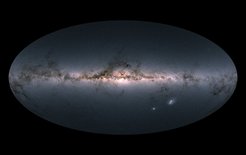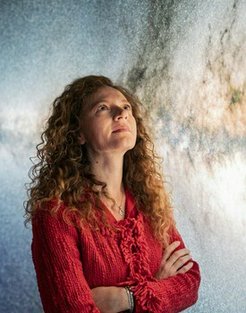Biermann Lectures 2022: Insights on the Milky Way’s history and dynamics
By Prof. Dr. Amina Helmi (Kapteyn Astronomical Institute, Groningen).
Archaeologists on Earth look for fossils – and so do astronomers in the field of galactic archaelogy. Their fossils, however, are stars, star systems and other large structures in our Milky Way that contain traces of what happened in our home galaxy billions of years ago. In this year’s Biermann lectures Professor Amina Helmi from the Kapteyn Astronomical Institute in Groningen will present how she combines theory, computer simulations, and observational campaigns to study the history of galaxies, in particular the Milky Way.

The hierarchical formation history of galaxies leaves imprints in their dynamical and chemical structure that can be traced in large-scale observational campaigns. Professor Amina Helmi is one of the world’s leading researchers in the field of galactic archeology, and she has used large datasets from Gaia and other surveys in combination with numerical simulations to reconstruct in detail the history of the Milky Way.
In particular, Helmi discovered in 2018 – when the first Gaia measurements of the motions of stars became available – that a rather large galaxy, called Gaia Enceladus, merged with our Milky Way about 10 billion years ago. The inner halo of our galaxy contains a lot of debris from this ancient collision. Combining these observations with theoretical calculations on powerful supercomputers, she showed how the merger led to changes in the galaxy dynamics and the structures, such as the thick disk, that we see today. In addition to this major merger, there were also many smaller galaxies merging with the Milky Way over its lifetime – consistent with cosmological simulations of structure formation.

Prof. Helmi obtained her PhD in astronomy from Leiden University in 2000 under the supervision of Tim de Zeeuw and Simon White. Following postdoctoral fellowships at the University of La Plata, the Max Planck Institute for Astrophysics, and the University of Utrecht, she became a professor at the University of Groningen in 2003. She has won many prestigious prizes and research grants, such as the Christiaan Huygens Prize, which she was awarded by the Royal Netherlands Academy of Arts and Sciences (KNAW) for her excellent PhD thesis, and the Spinoza Prize by the Netherlands Organisation for Scientific Research (NWO) in 2019. She has also received several important international grants and prizes, most recently the AAS Dirk Brouwer career award.
Overall title: Insights on the Milky Way’s history and dynamics
All lectures take place in the MPA Large Seminar Room E.0.11 and will be preceded by tea, coffee and cookies 15 minutes before the lecture starts.
Monday, July 4, 15:30
The Milky Way in context
Friday, July 15, 15:30
Milky Way’s early history
Wednesday July 20, 15:30
Dynamics and the dark matter halo of the Milky Way













